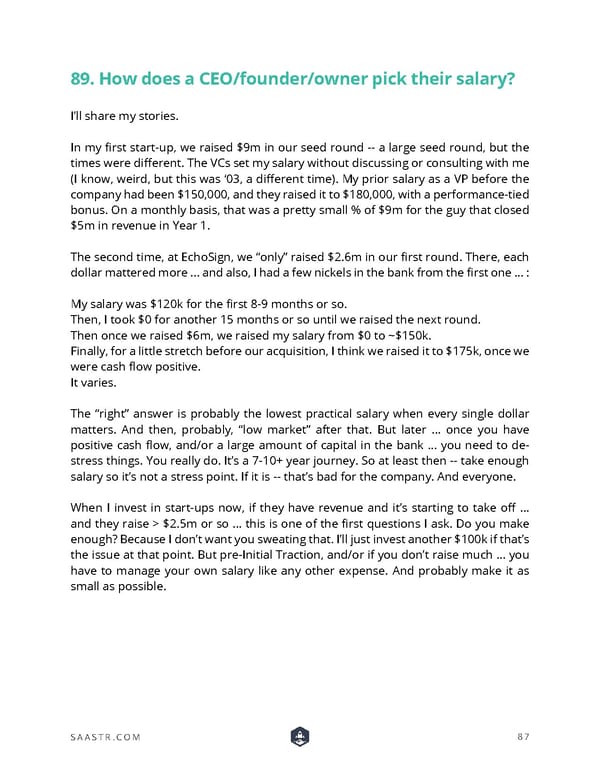89. How does a CEO/founder/owner pick their salary? I’ll share my stories. In my first start-up, we raised $9m in our seed round -- a large seed round, but the times were different. The VCs set my salary without discussing or consulting with me (I know, weird, but this was ‘03, a different time). My prior salary as a VP before the company had been $150,000, and they raised it to $180,000, with a performance-tied bonus. On a monthly basis, that was a pretty small % of $9m for the guy that closed $5m in revenue in Year 1. The second time, at EchoSign, we “only” raised $2.6m in our first round. There, each dollar mattered more ... and also, I had a few nickels in the bank from the first one ... : My salary was $120k for the first 8-9 months or so. Then, I took $0 for another 15 months or so until we raised the next round. Then once we raised $6m, we raised my salary from $0 to ~$150k. Finally, for a little stretch before our acquisition, I think we raised it to $175k, once we were cash flow positive. It varies. The “right” answer is probably the lowest practical salary when every single dollar matters. And then, probably, “low market” after that. But later ... once you have positive cash flow, and/or a large amount of capital in the bank ... you need to de- stress things. You really do. It’s a 7-10+ year journey. So at least then -- take enough salary so it’s not a stress point. If it is -- that’s bad for the company. And everyone. When I invest in start-ups now, if they have revenue and it’s starting to take off ... and they raise > $2.5m or so ... this is one of the first questions I ask. Do you make enough? Because I don’t want you sweating that. I’ll just invest another $100k if that’s the issue at that point. But pre-Initial Traction, and/or if you don’t raise much ... you have to manage your own salary like any other expense. And probably make it as small as possible. SAASTR.COM 87
 The Ultimate Guide For Scaling Sales & Raising Capital Page 90 Page 92
The Ultimate Guide For Scaling Sales & Raising Capital Page 90 Page 92